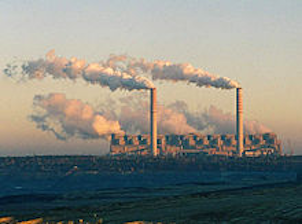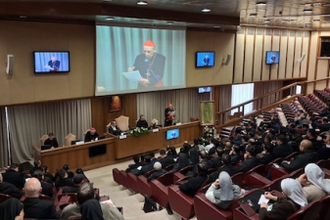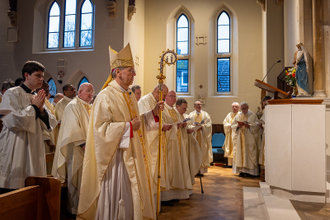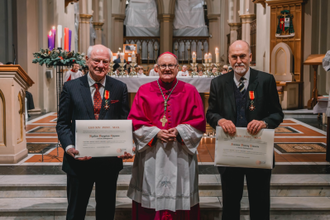Jesuits in Britain divest from fossil fuels

Coal Powered Power stations in Poland
The Jesuits in Britain have announced they are divesting from companies whose major income is from the extraction of fossil fuels - the largest Catholic religious order in the UK so far to join the global divestment movement. The Jesuits in Britain have equity investments of about £400 million used to finance works and projects here in Britain and around the world. The assets are under the management of three equity fund managers and will be fully divested by the end of 2020, with more than half of that divestment process already completed.
Fr Damian Howard SJ, the Provincial Superior of the British Jesuits, said: "Climate change is the most pressing challenge the world faces as climate disasters wreak more and more destruction, hitting poorer countries the hardest - despite them having done the least to cause them. The decision to divest is principally a response to the clear moral imperative of acting to safeguard our planet for future generations at a time when scientific evidence is mounting that we are facing a grave climate emergency. What happens to the climate and the environment will have implications for us all. That's why we need to act together to protect the conditions for human life. I am glad that the Jesuits can contribute to that joint effort.
"All our institutions need to respond to this ecological crisis and take bold action to reduce energy use and switch to renewable sources. Large-scale investors should be doing everything possible to help avert the severe consequences that could result if adequate measures are not taken."
The decision aligns the Jesuits in Britain with a global movement of divesting institutions with a combined value of more than $14 trillion in assets under management, up from a starting point of $50 billion just five years ago.
Efa Ravelonantoandro, Programmes Officer of the Centre Sociale Arrupe in Madagascar which is supported by Jesuit Missions, said: "Southern Madagascar is now too hot and we're seeing more internal migration and with it a rise in crime and a lack of jobs. More frequent and severe flooding across the country has increased diseases among the population. The Centre Arrupe is directly affected because the medical clinic has been flooded. We do have lots of rivers in Madagascar, but we are not generating enough renewable energy. We need more investment in cleaner, renewable energy and a shift away from fossil fuel sources."
Jesuit Missions is calling on the UK Government to take urgent action to reduce emissions and to encourage other nations to follow its lead, especially in the lead up to the crucial UN climate talks (COP26) taking place in Glasgow this November.
Paul Chitnis, Director of Jesuit Missions, said: "The world must respond to the enormous challenges and opportunities of climate change with far greater urgency. COP 26 in Glasgow can be the right moment. We see the impact of climate change on communities everywhere and it is the poorest, most marginalised people who suffer most. That is why the British public expect the UK to meet its climate commitments, including credible net-zero policies with the public and private investment necessary to achieve them."
James Buchanan, divestment campaigner at Christian climate change charity Operation Noah, said: "This significant decision taken by the Jesuits in Britain to divest from fossil fuel companies is the latest in a growing trend of religious institutions leading the way in shifting investments out of fossil fuels and investing in the clean technologies of the future. Of the total of more than 1,100 organisations contributing to the global divestment movement, 352 are faith-based institutions."
Operation Noah is working with the World Council of Churches, the Global Catholic Climate Movement and others to invite Churches, religious orders and faith organisations from around the world to participate in a major global divestment announcement on 26 March 2020, which will coincide with the Economy of Francesco conference in Assisi initiated by Pope Francis.
Fr Damian Howard SJ added: "Every action ripples out, healing or hurting others. Lent is a great opportunity to take concrete steps to harmonise our own needs with those of others. Let's tackle climate chaos together. Our Jesuit communities are also working to develop more sustainable ways of living, switching to green electricity and getting rid of some of their cars."
Jesuits in Britain recognise that this is just the beginning of a process of examining the wider impact of their investments, whether that be looking to increase positive investments in areas such as sustainable energy or to look deeper at the carbon footprint of companies invested in, or whether companies have links to potential human rights violations.
Jesuits in Canada, Italy and Australia have already announced their decisions to divest - as have the Jesuit European Social Centre in Brussels and the Jesuit Justice and Ecology Network Africa in Nairobi. The Catholic Dioceses of Middlesbrough and Lancaster became the first dioceses in England and Wales to divest from fossil fuels in January.
Jesuits in Britain together with 10 other institutional shareholders have taken formal action at Barclays, asking the bank to phase out its financing of fossil fuel companies that are active agents in driving the climate crisis. Coordinated by the responsible investment charity, ShareAction, the group has filed a shareholder resolution at Barclays alongside over 100 individual shareholders. It will be voted on by investors at Barclays' annual general meeting in May 2020.
Jesuits in Britain's decision to divest is just part of its response to the growing climate crisis.
· Jesuit Missions is working in 17 countries with Jesuit partner organisations which accompany vulnerable people living on the margins. Projects include: supporting environmental groups in Kenya; rebuilding safer and secure homes in the Philippines; working with local groups in India to prepare disaster response teams for future floods. Jesuit Missions also works with young people in schools to get them involved in shaping the world they want through its Companions in Action programme, with pupils calling on world leaders to deliver on their Paris Agreement pledges.
In response to Pope Francis's call to care for environment, the Jesuits in Britain are promoting Pope Francis's vision of integral ecology with three linked projects in three different locations, united by a common outlook: the Oxford-based Laudato Si' Research Institute will connect ecological thinking and research across disciplines; a new Jesuit community in south London is supporting young adults campaigning for a fairer, inclusive and sustainable world; and an education centre in central London will be offering events and courses in theology, spirituality, and social and environmental justice, including an MA programme accredited by Roehampton University. The Jesuits in Britain are also looking to ensure all the properties they invest in are run in as environmentally friendly a way as possible and Jesuit communities are working together to develop more sustainable ways of living.
Operation Noah is a Christian charity working with the Church to inspire action on the climate crisis. For more information, see www.operationnoah.org. Operation Noah's Bright Now campaign encourages UK Churches to divest from fossil fuels and invest in clean alternatives. For more information, visit www.brightnow.org.uk
The World Council of Churches, the Global Catholic Climate Movement, Green Anglicans, Operation Noah and GreenFaith are inviting religious and spiritual institutions from around the world to join a global divestment announcement on 26-28 March 2020. For more details, visit https://brightnow.org.uk/news/join-the-global-divestment-announcement-march-2020/


















